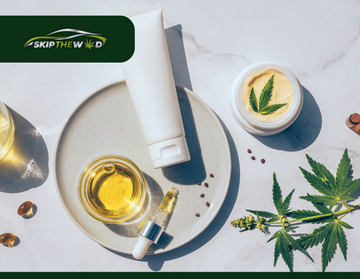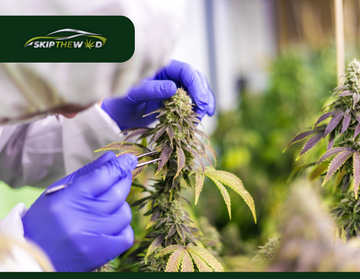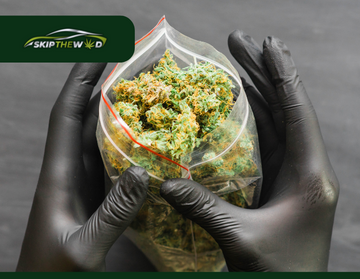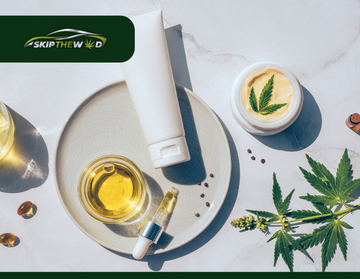Cannabidiol, better known as CBD, has experienced a surge in popularity over the last decade, evolving from a niche health supplement to a mainstream wellness product. As research on CBD’s potential health benefits continues to expand, its integration into wellness routines and consumer health products has grown significantly. From pain relief creams and anxiety-reducing tinctures to skincare and dietary supplements, CBD is now a prominent ingredient in various consumer health products.
In this article, we will explore the role of CBD in wellness, its potential benefits, and how it has become an integral part of the consumer health market.
What is CBD?
CBD is one of over 100 naturally occurring compounds called cannabinoids found in the cannabis plant. Unlike its more famous cousin, THC (tetrahydrocannabinol), which is responsible for the psychoactive effects of cannabis, CBD does not cause a "high." This has made it an attractive option for individuals seeking the therapeutic benefits of cannabis without the mind-altering effects associated with THC.
Derived primarily from hemp, CBD is used in various forms, including oils, tinctures, capsules, edibles, topicals, and even infused in beverages and skincare products. Its versatility and wide range of applications have made CBD a key player in the wellness industry.
The Rise of CBD in Wellness
CBD’s rise in popularity can be attributed to a growing body of research supporting its potential health benefits. Although much of the research is still in the early stages, there is promising evidence that CBD may help with conditions such as anxiety, chronic pain, insomnia, and inflammation. As a result, CBD has been embraced by both the wellness community and mainstream consumers seeking natural alternatives to conventional medicine.
Several factors have contributed to the increasing use of CBD in wellness, including:
- The shift toward holistic health: As more people seek natural remedies and holistic approaches to health, CBD has emerged as a plant-based option for managing various health issues.
- Increased awareness and legalization: The legalization of hemp-derived CBD in many countries, including the United States, has contributed to its widespread availability and consumer demand.
- Product diversity: CBD’s versatility allows it to be incorporated into a wide variety of products, from supplements to skincare, making it accessible to a broad audience.
The Potential Benefits of CBD in Wellness
While the therapeutic potential of CBD is still being researched, early studies and anecdotal evidence suggest that it may offer a range of health benefits. Below are some of the most common uses of CBD in wellness and consumer health products:
-
1. Pain Relief and Anti-Inflammation
One of the most well-documented benefits of CBD is its potential role in pain management. CBD interacts with the body's endocannabinoid system (ECS), which plays a crucial role in regulating various physiological processes, including pain perception and inflammation. By influencing the ECS, CBD may help reduce inflammation and alleviate chronic pain conditions, such as arthritis, muscle soreness, and neuropathy.
Many people now use CBD-infused topicals like balms, creams, and salves to target localized pain and inflammation. These products offer a natural alternative to over-the-counter pain relievers and prescription medications, without the risk of dependency or side effects.
-
2. Anxiety and Stress Reduction
In our rapidly evolving society, anxiety and stress have emerged as prevalent issues affecting a significant number of people. CBD has shown promise in reducing symptoms of anxiety and stress by interacting with serotonin receptors in the brain, which play a key role in regulating mood and emotional well-being.
Several studies have suggested that CBD may help alleviate symptoms of generalized anxiety disorder (GAD), social anxiety disorder, and post-traumatic stress disorder (PTSD). This has led to the rise of CBD tinctures and oils specifically marketed for anxiety relief, offering consumers a natural way to manage stress without the side effects of pharmaceutical medications.
-
3. Improving Sleep
CBD’s calming properties make it a popular choice for individuals struggling with insomnia and other sleep disorders. By promoting relaxation and reducing anxiety, CBD may help individuals fall asleep more easily and improve the overall quality of their sleep.
Many wellness products now contain CBD as a sleep aid, often combined with other natural ingredients like melatonin or lavender. These products are designed to help users unwind and achieve a restful night’s sleep without the grogginess often associated with over-the-counter sleep medications.
-
4. Skin Health
The anti-inflammatory and antioxidant properties of CBD have made it a sought-after ingredient in the skincare industry. CBD’s ability to regulate sebum production and soothe irritated skin has shown potential in treating conditions like acne, eczema, and psoriasis.
CBD is now found in a variety of skincare products, including moisturizers, serums, and face masks, targeting everything from aging to sensitive skin. Its natural properties make it an appealing option for individuals looking for chemical-free skincare solutions that promote healthy, glowing skin.
-
5. Neuroprotective Benefits
Research into CBD’s neuroprotective properties is still in its infancy, but early studies suggest that CBD may have potential in managing neurodegenerative diseases, such as Alzheimer’s disease, Parkinson’s disease, and multiple sclerosis. CBD’s ability to reduce inflammation and oxidative stress could help protect neurons and slow the progression of these conditions.
While more research is needed, CBD’s neuroprotective potential offers hope for future treatments and interventions for individuals suffering from chronic neurological conditions.
-
6. Supporting Gut Health
CBD has been shown to influence the body's gut-brain axis, which connects the digestive system to the central nervous system. This connection plays a significant role in digestive health, and CBD’s anti-inflammatory properties may help alleviate symptoms of digestive disorders like irritable bowel syndrome (IBS) and Crohn's disease.
Many individuals are now incorporating CBD into their wellness routines to support gut health, with CBD-infused beverages and supplements designed specifically to promote digestive balance.
CBD in Consumer Health Products
CBD’s versatility and range of potential health benefits have made it a staple ingredient in a variety of consumer health products. Here are some common CBD-infused products available on the market:
-
1. CBD Oils and Tinctures
CBD oils and tinctures are some of the most popular and versatile forms of CBD. They can be taken sublingually (under the tongue) for fast absorption or added to food and drinks for a more subtle experience. CBD oils come in various concentrations, allowing consumers to tailor their dosage based on their specific needs.
-
2. CBD Edibles
CBD edibles, such as gummies, chocolates, and beverages, offer a convenient and enjoyable way to incorporate CBD into daily routines. Edibles provide a longer-lasting effect compared to oils or tinctures, as they must be digested before the CBD is absorbed into the bloodstream.
-
3. CBD Topicals
CBD topicals, including creams, lotions, and salves, are designed for external use and are often used to target localized pain, inflammation, and skin conditions. These products allow users to apply CBD directly to the affected area, making them ideal for athletes or individuals with joint or muscle pain.
-
3. CBD Capsules and Supplements
For individuals seeking a more convenient way to take CBD, capsules and supplements offer a consistent and measured dose of CBD. These products are often formulated with additional vitamins and minerals to support overall wellness.
-
5. CBD Skincare
As previously mentioned, CBD is becoming a popular ingredient in skincare products. CBD serums, creams, and masks are used to treat a variety of skin concerns, from acne to signs of aging. The anti-inflammatory and antioxidant properties of CBD make it a valuable addition to skincare routines focused on promoting healthy, radiant skin.
The Future of CBD in Wellness
The future of CBD in wellness and consumer health products looks promising. As more research is conducted on the benefits of CBD, we can expect to see an even broader range of products catering to specific health needs. The wellness industry’s embrace of natural and holistic remedies ensures that CBD will continue to play a central role in supporting overall health and well-being.
However, it is essential for consumers to be mindful when purchasing CBD products. Due to the lack of regulation in the industry, the quality of CBD products can vary widely. To ensure the best results, it’s important to choose products from reputable brands that provide third-party lab testing and transparency about their sourcing and production methods.
Conclusion
CBD has established itself as a key player in the wellness and consumer health markets, offering potential benefits for pain relief, anxiety reduction, sleep improvement, and skin health. As research on its therapeutic properties continues to expand, so does its role in supporting a holistic approach to health and well-being.
At Skip the Weed, we offer high-quality CBD products designed to help you harness the benefits of CBD in your daily wellness routine. Try our Strawberry Cooler strain, known for its calming effects and ideal for relaxation after a long day. Additionally, our Super Skunk strain offers a potent CBD profile that can support pain relief and stress management. By choosing Skip the Weed, you can feel confident in the quality of the CBD products you’re using as part of your wellness journey.









